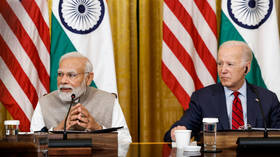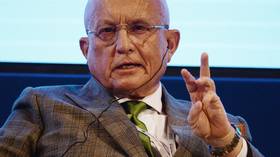Love triangles aren’t an option: Can Russia and India stay friendly without upsetting their Chinese and American partners?
Moscow must realize that New Delhi is developing relations with Washington for its own benefit. But India has to accept the same when it comes to Russia and China
By Gleb Makarevich, Deputy Head of Centre for the Indian Ocean Region Studies, IMEMO RAS
When it comes to Russian-Indian relations, despite the historical achievements and successes of recent years, there have been many problems. They mainly relate to bilateral economic ties: including low rates of trade and investment activity, too much focus on a limited amount of key areas (military-technical cooperation, nuclear energy, oil and gas sector), and a low awareness among private sector players regarding each other’s markets.
These problems are surmountable. Russia’s need for reliable foreign economic partners and its policy of diversifying its economic ties creates the conditions for the two countries to achieve a structural transformation of their relations. The presence of similar strategies for overcoming global development imbalances, a common vision of technological progress (including technology transfers and the establishment of joint ventures), and joint investments in research and development – all these steps will help the two countries not only honor their connected past, but also look to the future together.
However, in recent decades, political challenges have been added to the economic challenges of the especially privileged strategic partnership between Russia and India: Moscow, in particular, is concerned about the rapid uptick in relations between Washington and New Delhi.
The comprehensive global strategic partnership between India and the US is a logical outcome of the evolution of Indian politics since the 1990s. At the time, the government of Prime Minister Narasimha Rao began a gradual process of economic liberalisation. The country was to become an attractive target for foreign investment, since there was not enough financial capital domestically.
The ‘opening up’ of the Indian economy to foreign investors has continued under his successor Narendra Modi – with the ‘Make in India’ initiative inviting foreign manufacturers to locate their production facilities in the South Asian country. A kind of continuation of the this has been the ‘Self-sufficient India’ (Aatmnitbhar Bharat) programme. On the one hand, it is aimed at achieving technological sovereignty, and on the other, it forces foreign manufacturers to localise their production.
Despite the increase in the gross savings rate, India still needs foreign investment to accelerate industrial development and provide jobs for its growing population – these problems are considered existential in New Delhi. In this vein, the US has become a vital partner – no other country has the amount of free capital that can satisfy Indian ‘appetites’.
The economic interest of the countries in each other has been superimposed by political factors. India’s defeat in the Sino-Indian War of 1962 was a blow for New Delhi, from which the modern Indian political elite has been unable to recover. The rapid economic development of China, compounded by an accelerated military build-up, has intensified alarmist sentiments in India.
New Delhi is especially concerned about the development of the Chinese Navy. From India’s perspective, Beijing wants to ensure dominance in the Indo-Pacific. In this context, cooperation with the Americans is seen by the Indians as one of the few ways to neutralise the threats to their security.
The Indo-American strategic partnership is a long-term trend that no one, including Russia, will be able to reverse. Moscow needs to realize that Indian political elites are expanding their contacts with the Americans not because of pressure from Washington, but because, in their opinion, cooperation with the US is in their national interests. Attempts to convince them that they misunderstand their national interests will not only not bring results, but also harm Russian-Indian relations.
If such a perception becomes part of the mainstream of Russian political discourse, Moscow has to expect from New Delhi a similar attitude towards its “relations of comprehensive partnership and strategic interaction of a new era” with Beijing.
Russia and China are neighbours with a long history of bilateral relations. The political elites of the Russian Federation and China have similar views on most current global and regional problems, and economic cooperation between the countries is developing at a rapid pace. At the same time, ‘partnership without forming an alliance’ is not directed against third countries; it is calculated solely to satisfy the national interests of Russia and China.
The strategic nature of relations, on the one hand, is intuitive and does not need further explanation. On the other hand, any strategic partnership is the result of long-term interaction; it is shaped under the influence of unique factors and cannot be reduced to a common denominator.
Both Russia and India are pursuing independent foreign policy based on their national interests. The elites of both countries will have to accept his, if they wish to maintain close ties going forward.
This piece was originally published by Valdai Discussion Club and edited by the RT team







Comments are closed.